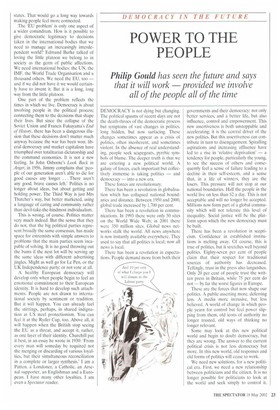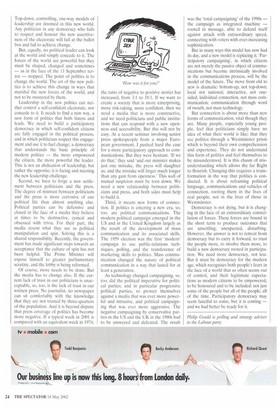POWER TO THE PEOPLE
Philip Gould has seen the future and says
that it will work — provided we involve all of the people all of the time
DEMOCRACY is not dying but changing. The political spasms of recent days are not the death-throes of the democratic process but symptoms of vast changes in politics, long hidden, but now surfacing. These changes sometimes appear as a crisis of politics, often incoherent, and sometimes violent. In the absence of real understanding, people seek scapegoats, pyrrhic symbols of blame. The deeper truth is that we are entering a new political world. A galaxy of forces, each important but collectively immense is taking politics — and democracy — into a new era.
These forces are revolutionary.
There has been a revolution in globalisation which has collapsed national boundaries and distance. Between 1950 and 2000, global trade increased by 1,700 per cent.
There has been a revolution in communications. In 1993 there were only 50 sites on the World Wide Web; in 2001 there were 350 million sites. Global news networks stalk the world. All news anywhere is now instantly available everywhere. They used to say that all politics is local; now all news is local.
There has been a revolution in expectations. People demand more from both their governments and their democracy; not only better services, and a better life, but also influence, control and empowerment. This new assertiveness is both unstoppable and accelerating; it is the central driver of the new politics. But this assertiveness can contribute in turn to disengagement. Spiralling aspirations and increasing affluence have led to a rise in 'relative deprivation' — a tendency for people, particularly the young, to see the success of others and consequently feel a sense of failure leading to a decline in their self-esteem, and a sense that, in a life of winners, they are the losers. This pressure will not stop at our national boundaries. Half the people in the world live on less than S2 a day. This is not acceptable and will no longer be accepted. Millions now form part of a global community which will not tolerate this level of inequality. Social justice will be the platform upon which the new democracy must be built.
There has been a revolution in scepticism. Confidence in established institutions is melting away. Of course, this is true of politics, but it stretches well beyond politics. Eighty-seven per cent of people claim that their respect for traditional sources of authority has decreased. Tellingly, trust in the press also languishes. Only 20 per cent of people trust the written press in Britain, while 75 per cent do not — by far the worst figures in Europe.
These are the forces that now shape our politics. A public asserting more, deferring less. A media more intrusive, but less believed. A world of change in which people yearn for control but feel power slipping from them, old icons of authority no longer trusted, old ways of thinking no longer relevant.
Some may look at this new political world and begin to doubt democracy, but they are wrong. The answer to the current political crisis is not less democracy but more. In this new world, old responses and old forms of politics will cease to work.
We need new solutions, for a new political era. First, we need a new relationship between politicians and the citizen. It is no longer possible for politicians to look at the world and seek simply to control it. Top-down, controlling, one-way models of leadership are doomed in this new world. Any politician in any democracy who fails to respect and honour the new assertiveness of the electorate will fail at the ballot box and fail to achieve change.
But, equally, no political leader can look at the world and simply concede to it. The forces of the world are powerful but they must be shaped, changed and sometimes — as in the face of the 11 September terror — stopped. The point of politics is to change the world. The art of the new politics is to achieve this change in ways that marshal the new forces of the world, and not to be mastered by them.
Leadership in the new politics can neither control a self-confident electorate, nor concede to it. It needs to find a new way, a new form of politics that both listens and leads. We need to build a participatory democracy in which self-confident citizens are fully engaged in the political process, and in which politicians respect this engagement and use it to fuel change; a democracy that understands the basic principle of modern politics — the more empowered the citizen, the more powerful the leader. This is not an abdication of leadership, but rather the opposite; it is facing and meeting the new leadership challenge.
Second, we have to forge a new settlement between politicians and the press. The degree of mistrust between politicians and the press is more corrosive of our political life than almost anything else. Political parties can be defensive and closed in the face of a media they believe at times to be destructive, cynical and obsessed with trivia. For their part, the media resent what they see as political manipulation and spin. Solving this is a shared responsibility. Recently, the government has made significant steps towards an acceptance that the culture of spin has not been helpful. The Prime Minister will expose himself to greater parliamentary scrutiny, and the lobby is being reformed.
Of course, more needs to be done. But the media has to change also. If the current lack of trust in our politicians is unacceptable, so, too, is the lack of trust in our written press. No journalist, no newspaper can sit comfortably with the knowledge that they are not trusted by three-quarters of the population. And it is beyond dispute that press coverage of politics has become more negative. If a typical week in 2001 is compared with an equivalent week in 1974, the ratio of negative to positive stories has increased, from 3:1 to 18:1. If we want to create a society that is more enterprising, more risk-taking, more confident, then we need a media that is more constructive, and we need politicians and public institutions that can respond with a new openness and accessibility. But this will not be easy. At a recent seminar involving senior press spokespeople from a major European government, I pushed hard the case for a more participatory approach to communications. But they were hesitant. 'If we do that,' they said 'and our minister makes just one mistake, the press will slaughter us, and the mistake will linger much longer than any gain from openness.' This wall of mutual suspicion must be torn down. We need a new relationship between politicians and press, and both sides must help to build it.
Third, it means new forms of connection. If politics is entering a new era, so, too, are political communications. The modern political campaign emerged in the US and in the United Kingdom largely as the result of the development of mass communication and its associated skills. The 1959 election was the first 'modern' campaign to use public-relations techniques, polling, and the transference of marketing skills to politics. Mass communication changed the nature of political communication in a way that lasted for at least a generation.
As technology changed campaigning, so, too, did the political imperative for political parties, and in particular progressive political parties, to protect themselves against a media that was ever more powerful and intrusive, and political campaigning that was ever more aggressive. The negative campaigning by conservative parties in the US and the UK in the 1980s had to be answered and defeated. The result was the 'total campaigning' of the 1990s — the campaign as integrated machine — rooted in message, able to defend itself against attack with extraordinary speed, connecting with voters with ever-increasing sophistication.
But in many ways this model has now had its day, and a new model is replacing it. 'Participatory campaigning', in which citizens are not merely the passive object of communications but become intrinsically involved in the communications process, will be the model of the future. The move from old to new is dramatic: bottom-up, not top-down: local not national; interactive, not onesided; individual connection, not mass communication; communication through word of mouth, not mass technology.
But connection is about more than new forms of communication, vital though they are. Many people, especially young people, feel that politicians simply have no idea of what their world is like; that they see politics through a Westminster prism which is beyond their own comprehension and experience. They do not understand this form of politics and feel themselves to be misunderstood. It is this chasm of misunderstanding which allows the far Right to flourish. Changing this requires a transformation in the way that politics is conducted. It is about reframing political language, communications and vehicles of connection, rooting them in the lives of real people, not in the lives of those in Westminster.
Democracy is not dying, but it is changing in the face of an extraordinary constellation of forces. These forces are bound in the short term to produce outcomes that are unsettling, unexpected, disturbing. However, the answer is not to retreat from democracy but to carry it forward, to trust the people more, to involve them more, to build a new democracy rooted in participation. We need more democracy, not less. But it must be democracy for the modern age, which recognises both people's fears in the face of a world that so often seems out of control, and their legitimate expectations as modern citizens to be empowered, to be honoured and to be included: not just some of the people but all of the people, all of the time Participatory democracy may seem fanciful to some, but it is coming — and we had better be ready for it.
Philip Gould is polling and strategy adviser to the Labour















































































 Previous page
Previous page